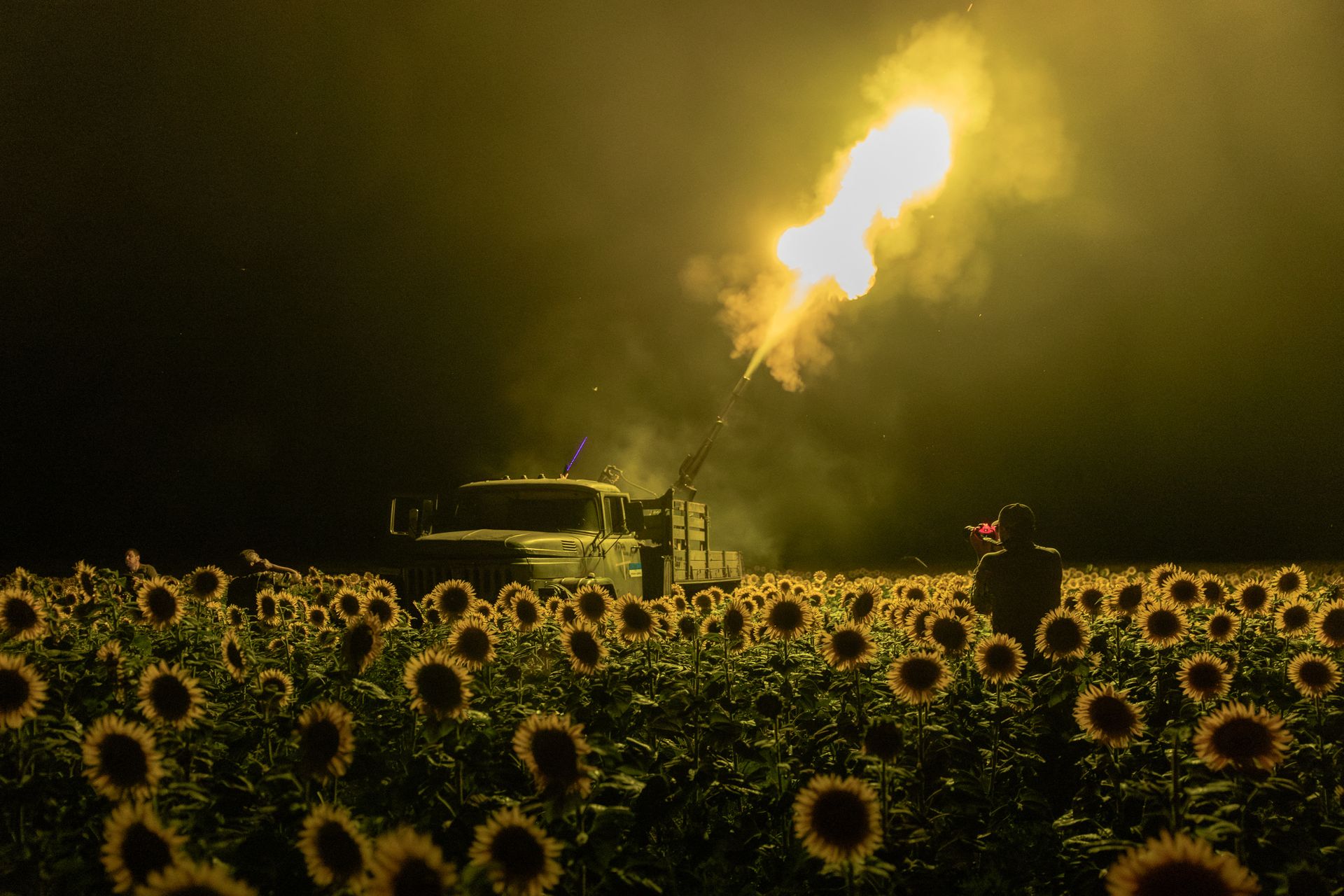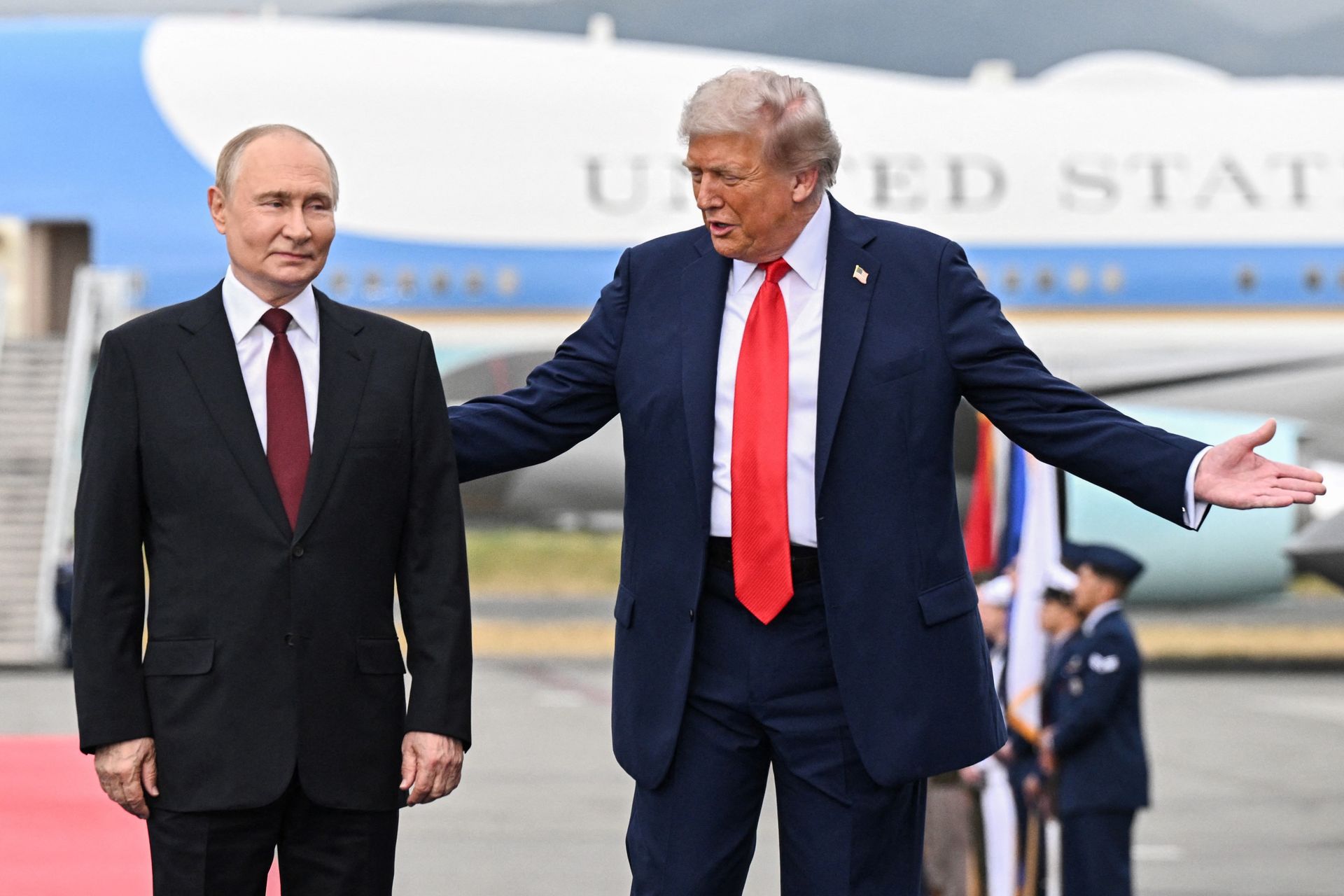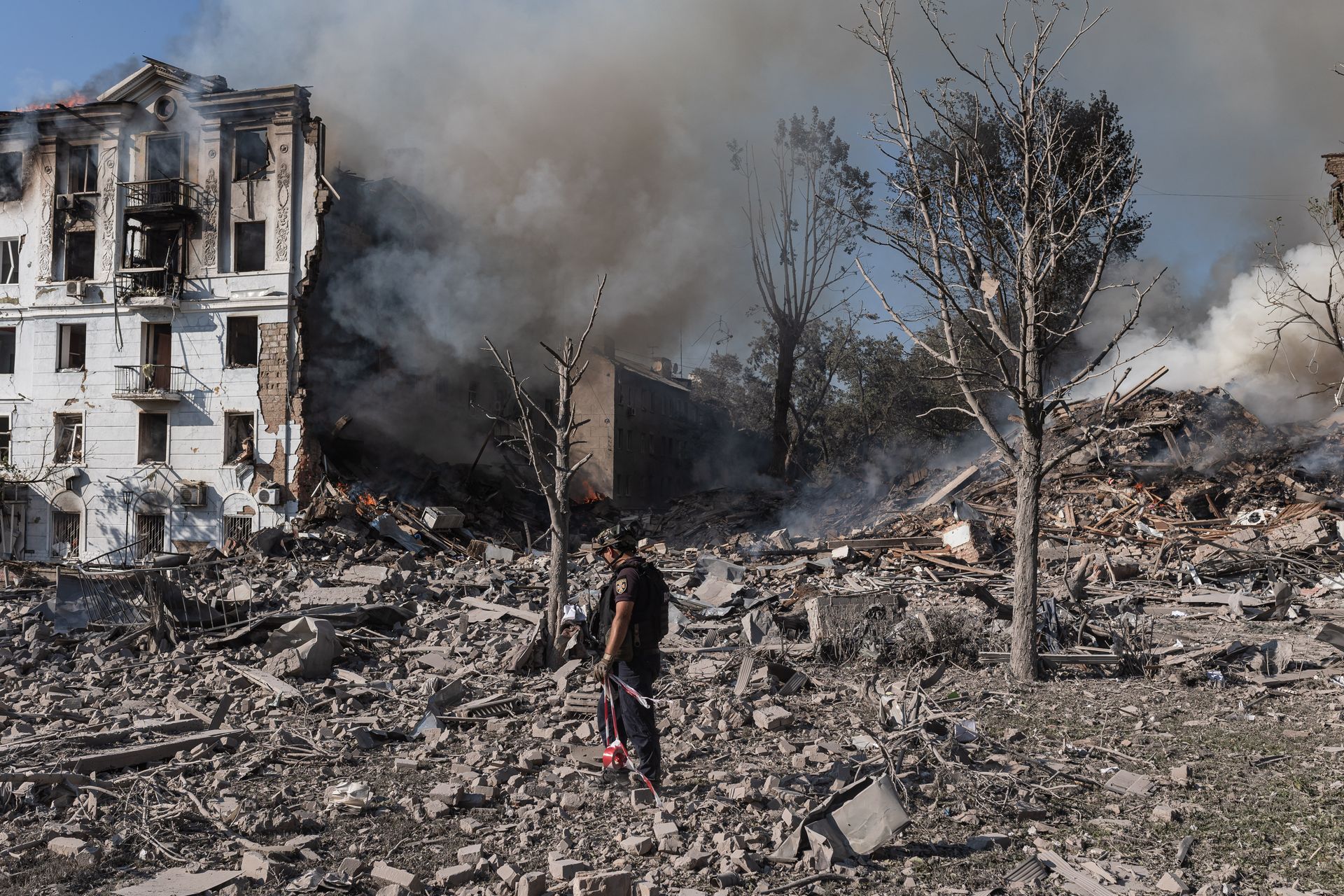As Zelensky, Trump prepare to talk about peace, most Russian demands are non-starters for Ukraine

President Volodymyr Zelensky in Berlin, Germany, on Aug. 13, 2025. (Omer Messinger/Getty Images)
Russian President Vladimir Putin has laid out a number of demands that he would require to stop his country's war against Ukraine.
Most of these demands are non-starters for Ukraine, analysts say.
Russia has demanded a full Ukrainian withdrawal from Donetsk and Luhansk oblasts, de jure recognition of the occupied territories as Russian, a special status for the Russian-backed church and the Russian language in Ukraine, Kyiv's demilitarization, and a ban on Kyiv's NATO membership.
In exchange, Ukraine is being offered contradictory statements on potential guarantees, yet to be defined.
The Kyiv Independent has compiled all the demands laid out by Putin and explains why most of them are unlikely to be accepted by Ukraine.

Land swaps
Since 2022, Russia has demanded that Ukrainian troops withdraw from all regions that Russia partially controls and claims to have annexed.
Russia illegally annexed Ukraine's Crimea peninsula in 2014. The Kremlin also announced the illegal annexation of Ukraine's Kherson, Zaporizhzhia, Donetsk, and Luhansk oblasts in 2022 despite only partially controlling them.
During the recent talks with U.S. President Donald Trump, Putin appeared to have softened this maximalist demand.
The U.S. and Russia have discussed "land swaps" — exchanging de facto control of territory. However, reports on such swaps have been contradictory, and no specific swap plans have been officially announced.
According to some reports, Putin has agreed not to claim the cities of Kherson and Zaporizhzhia, which Russia claims to have annexed but does not control. In exchange, Putin wants Ukrainian troops to withdraw from the remaining part of Luhansk and Donetsk oblasts.
Based on other reports, including one by the Kyiv Independent, Putin has agreed to withdraw Russian troops from small parts of Sumy and Kharkiv oblasts in exchange for Ukraine withdrawing from Donetsk Oblast.
But analysts see the land swap plans as a non-starter.
"The suggestions of land swaps are very one-sided and all in Russia's favor," Jenny Mathers, a lecturer in international politics at the U.K.'s Aberystwyth University, told the Kyiv Independent. "This, I suspect, would also be a red line for Ukraine."
James Shea, a defense and security expert at Chatham House, argued that "it makes no strategic sense for Ukraine to give to Russia the 30% of (Donetsk Oblast) that it still controls and which Russia has not been able to capture in over three years of fighting."
"Also just to get back in exchange a small area around Sumy and Kharkiv where the Ukrainian army is already pushing back the Russian army," he told the Kyiv Independent. "That is hardly an equitable 'swap' and it is all Ukraine's sovereign territory. Russia is not being asked to make any real concessions, only to limit its outrageous territorial ambitions."


He argued that "from a military perspective it is imperative for Kyiv to hold on to towns like Kramatorsk and Sloviansk (in Donetsk Oblast), which are important defensive positions and transport and communications hubs."
"If Ukraine gives up all of Donetsk (Oblast), it will lose its current fortified defensive line and will have to rebuild that line in less favorable open countryside closer to Dnipro," Shea added. "This will be costly and time consuming."
Analysts also say that, instead of bringing peace, a withdrawal from the Donbas will just whet Putin's appetite for more territory.
Ukrainian political analyst Volodymyr Fesenko told the Kyiv Independent that, "if Ukraine withdraws from the Donbas, tomorrow Putin will demand a Ukrainian withdrawal from Kherson and Zaporizhzhia, and then from Kharkiv and Odesa."
Fesenko argued that Zelensky would not agree to a unilateral withdrawal from Donetsk and Luhansk oblasts.
Zelensky has publicly made it clear that Kyiv is not willing to withdraw its troops from Ukrainian territory.
De jure recognition
The Kremlin has also consistently demanded that Ukraine recognize the illegal annexations of its regions.
Previously, Trump reportedly floated the idea of potentially recognizing Crimea as Russian de jure. However, Ukraine has rejected demands for recognizing any occupied territories as Russian de jure.
"Sadly, I do see Trump giving official recognition to Russia's claims to Ukrainian territories," Mathers said. "But I suspect that would be a point of absolute refusal for Ukraine."
Charly Salonius-Pasternak, lead researcher at the Center on U.S. Politics and Power at the Finnish Institute of International Affairs, said that, if the U.S. recognized any occupied territories de jure, it "would be a fundamental shift in U.S. policy and would mean that borders are changed unilaterally through the use of military force."
He told the Kyiv Independent that he suspects the final U.S. decision might imply de facto recognition but will "fall short of de jure recognition" due to European and Ukrainian opposition.
Fesenko argued that it would be absolutely impossible for Ukraine to recognize any occupied territories as Russian de jure. Ukrainian public opinion is overwhelmingly against this, and some analysts argue it would be tantamount to a political suicide for Zelensky.
This also makes a full-fledged peace agreement impossible since it would be expected to include a territorial settlement, Fesenko told the Kyiv Independent.
He added, however, that Putin and Trump might push for a partial or abridged peace agreement that would not stipulate any de jure recognition of territories.
No NATO membership
Ukraine considers NATO accession to be the best possible security guarantee for the post-war country.
Trump's presidency made that goal elusive.
After meeting Putin in Alaska, the U.S. leader once again spoke out against Ukraine's NATO path, effectively aligning with Russia's long-standing demand that Ukraine remain a neutral state outside the alliance.
Ukrainian lawmaker Oleksandr Merezhko, head of the parliament's foreign affairs committee, said that "under no circumstances should Ukraine abandon its goal of joining NATO, as it is the best guarantee of our security and survival."
Russia invaded Ukraine in 2014 when there were no talks about Ukraine joining NATO. The public opinion prior to Russia's invasion was also not in favor of joining the bloc meaning that Moscow's aggression was not a reaction to NATO expansion but rather a move to undermine Ukraine's sovereignty.

Kyiv's accession to NATO would mean that any potential new attack by Russia would be considered an attack against all member countries of the alliance, who — under Article 5 — would be obligated to collectively respond and defend against the aggression.
Earlier, Zelensky called the removal of Ukraine's NATO membership from the negotiations a "big gift to Russia" by Washington, saying that Kyiv's accession will strengthen the military alliance.
"Russia could come back in 10 years if we are not prepared. They won't return if we push them back to where they belong, onto their own territory, and if Ukraine becomes part of the EU and NATO in the near future," Zelensky said.
"They won't return if we have a strong army, an alliance, and unity."
Experts have said, however, that this is among the very few Russian demands that can be negotiated during potential peace talks, since the U.S. has been publicly against inviting Ukraine to join.
"Demilitarization"
"Demilitarization" and "denazification" were two false pretexts the Kremlin used to launch its full-scale invasion of Ukraine in February 2022.
At the outset of Russia's full-scale invasion, President Volodymyr Zelensky dismissed both terms as "completely incomprehensible."
While the Kremlin gradually dropped the "denazification" rhetoric, it continued to invoke "demilitarization" as a condition for ending the war. In June 2023, the Kremlin claimed that Ukraine had been "largely demilitarized," using the term to frame its military goals as defensive rather than imperial.
According to Putin, the goal of the so-called demilitarization is to "deprive (Ukraine) of the ability to maintain Armed Forces that could pose a threat to Russia."
At the beginning of the full-scale invasion, Russia demanded that Ukraine reduce its army to 50,000 personnel, five times fewer than the country had by 2022, Radio Free Europe/Radio Liberty's (RFE/RL) reported.
Moscow also reportedly sought to ensure that Kyiv "did not develop, produce, purchase, or deploy missile weapons of any kind with a range of over 250 kilometers (156 miles) on its territory."
Zelensky repeatedly insisted that Ukraine will not agree to reduce its Armed Forces — even if Kyiv receives an invitation to join NATO.
Russian language and church
Moscow continues to justify its full-scale invasion of Ukraine by claiming to defend the Russian-speaking population.
The people Russia claims to protect, however, overwhelmingly reject these claims.
Over 80% of Russian-speaking Ukrainians view Russia negatively, showed the survey published in May by the Kyiv-based think tank Razumkov Center in cooperation with the Kyiv Security Forum.
Although Ukrainian is the official state language, many Ukrainians speak Russian due to centuries of Russification that took place under the Russian Empire and the Soviet Union.
For most, speaking Russian doesn't mean loyalty to Russia. Yet, the Kremlin exploits the language as a propaganda tool, suggesting that Russian-speaking Ukrainians want to unite with Moscow.
"A step backward in language is a step toward losing the state. Ukrainian was, is, and will remain the sole state language," Olena Ivanovska, language ombudsman, said on Aug. 17, denouncing Putin's demands as "cynical and unacceptable."


The ombudsman said that while Russia portrays the Russian language as merely a "language of communication," in reality, it has long been wielded as "a tool of imperial policy — used for centuries to impose feelings of inferiority, suppress Ukrainian culture, and attempt to erase our national identity."
"The Moscow Patriarchate is part of the same machinery of subjugation," she added.
Russian propaganda has sought to portray Ukraine's move to ban the Moscow-linked church as "persecution of Christians."
Orthodox Christianity remains the most widely spread and practiced religion in Ukraine, while the steps against the church are based on evidence of its collaboration with Russia.
Over 170 Moscow-linked clergy members have come under criminal investigation since the outbreak of the full-scale war, said Vasyl Maliuk, Ukraine's Security Service chief, in mid-August.
Those accused include bishops and senior clerics, some of whom are alleged to have openly justified Russian aggression or cooperated with Russian forces.
In 2024, some 63% of Ukrainians were in favor of banning the UOC-MP, according to surveys.
Security guarantees for Ukraine
The flurry of Russian demands comes down to this — what does Ukraine get in return?
U.S. President Donald Trump's Special Envoy Steve Witkoff has claimed that an Article 5-style security guarantee — but not NATO membership —for Ukraine was being discussed.
NATO's Article 5 says that an armed attack against one member "shall be considered an attack against them all" and that each member will take "such action as it deems necessary, including the use of armed force, to restore and maintain the security of the North Atlantic area."
Among other things, this could include sending troops to a country that is attacked.
However, analysts argue that the U.S. is highly unlikely to provide such a strong guarantee.
Shea, from Chatham House, said that "Witkoff has a habit of misunderstanding Putin and coming back from Moscow with a far too optimistic interpretation of what Putin has told him."
"Putin has broken so many treaties and agreements that these are not worth the paper they are written on."
"It seems improbable that Putin will really accept an Article 5 security guarantee as this in reality would be tantamount to NATO membership for Ukraine or inevitably lead to it in the near future," he added. "So I am convinced that this is a Russian smokescreen and that Putin will row it back once the talks begin... Putin's strategic aim remains to subjugate Ukraine, and a U.S. security guarantee would prevent this from being achieved."
Neil Melvin, director of international security studies at the Royal United Services Institute, also said that "there is little clarity on what President Trump has in mind, and his sudden pivot to this issue raises skepticism about how deep the U.S. commitment to such guarantees would be."
"This is especially uncertain as for many months now the European discussion with Washington has been about the United States rebalancing its forces away from Europe to concentrate on China in the Indo-Pacific," he said. "Now suddenly, Trump seems to have committed the U.S. directly to Ukraine's security... So, a key issue is how credible the Trump political promise is, given the evolution of U.S. national security interests."
Bettina Renz, a professor of international security at Nottingham University, argued that "as Sweden and Finland concluded when they joined NATO following the Russian full-scale invasion of Ukraine in 2022, being under NATO's nuclear umbrella and Article 5 was the only security guarantee they felt comfortable with in the face of Russian military aggression."
"It is difficult to see how any security guarantees less than these would be credible to Ukraine, moreover, since Ukraine already has been at the receiving end of devastating Russian military aggression for many years and, realistically, also will be more likely to experience such aggression again in the future than most other states in Russia's vicinity," she added.
The maximum that could happen is a symbolic contingent of European peacekeepers in Ukraine with some U.S. logistical support, Ukrainian political analyst Volodymyr Fesenko told the Kyiv Independent, adding this was not enough for Ukraine.
Shea said that one of the weak security guarantee options would be "a treaty or paper agreement which restricts the role of Western troops in Ukraine to an unarmed or lightly armed ceasefire monitoring force with limited numbers and no heavy military equipment."
Melvin said that "the most valuable security guarantee from Trump that would be realistic is likely to be a commitment to supply Ukraine with U.S. weapons, continued provision of U.S. intelligence and training, and to support European efforts for Ukraine."
"But this does not sound enough for Ukraine to surrender its defensive positions in the Donbas," he added.
Witkoff has also said that Russia could agree to "legislative enshrinement within the Russian Federation not to go after any other territory when the peace deal is codified."
Analysts argue that this "guarantee" is meaningless.
"Putin has broken so many treaties and agreements that these are not worth the paper they are written on," Shea said.
Russia signed the 1994 Budapest Memorandum, under which Ukraine gave up Soviet nuclear weapons in exchange for Moscow and other signatories respecting its territorial integrity.
In 1997, Russia also signed a friendship and partnership agreement with Ukraine, which again required Moscow to respect Ukraine's territorial integrity.














